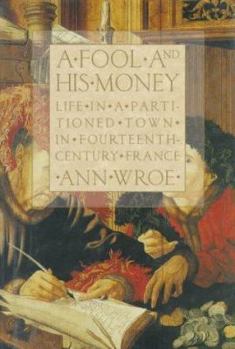A Fool and His Money: Life in a Partitioned Town in Fourteenth-Century France
Select Format
Select Condition 
Book Overview
Ann Wroe brings to life a rich and perplexing culture of a city physically divided-as so many communities are today-by political factions in this skillful re-creation of fourteenth-century Rodez.... This description may be from another edition of this product.
Format:Hardcover
Language:English
ISBN:0809045958
ISBN13:9780809045952
Release Date:January 1995
Publisher:Hill & Wang
Length:243 Pages
Weight:0.88 lbs.
Dimensions:0.9" x 5.8" x 8.6"
Customer Reviews
3 ratings
History From the Ground Up
Published by Thriftbooks.com User , 16 years ago
Why has no one made a movie of this book? A magnificent hill town in central France in the century of the Hundred Years War, a prolonged courtroom drama with gold at stake and with the whole community embroiled, a befuddled miser as the central character, his sly in-laws as the antagonists, the clergy and the bourgeousie in subtle conflict. Of course, a lot of the historical data and analysis would have to be omitted - that stuff about markets and trade, civic government, the effects of war on the economy, the efforts of people to avoid onerous taxes - and then a heady dose of imagination applied to achieve a satisfying denouement... but think of it, with Louis Malle directing and Gerard Depardieu as the judge! I've read all six previous reviews of this book, all six complaining that too much historical information is included to distract the reader from the exciting tale of greed, all suggesting that Ann Wroe should have written anovel instead. Well, pardon me, friends, but you've missed the point. Yes, Ann Wroe writes very well and no doubt could have invented a proper novelistic ending for her narrative, but entertaining you was not her chief purpose. What she's written here is an insightful account of the life of ordinary people in an ordinary town, the sort of people who are seldom observed in history. Here's what she says about her own work: **The story of [Peyre] Marques was preserved quite accidentally. We know about him only because a pitcher of gold was found buried in the floor of his shop. His son-in-law took it away, and ownership of the money was disputed in court. The result was a full-scale inquiry -- detailed character references, anecdotes, gossip -- about a man who was perfectly ordinary... For that reason alone, this case is precious. History keeps memorials of the great, the saintly or the vicious, but we may pine for the chance to hear about men and women more like ourselves: common folk. Wroe's chief source for her narrative is the preserved court transcript from a trail in Rodez, France, in 1370. But Wroe also draws from other sources, principally her huge horde of general knowledge about the Middle Ages, the Hundred Years War, the history of the clergy in France, etc. In other words, the trial is only a framework for an attempt to describe the activities and values of a historical community, as little fictionalized as possible. I've studied a bit of this history also, and I've never read a book that captured an image of life in the Middle Ages more vividly yet reliably. Like one of those reviewers who wanted a novel instead of a history, I enjoyed this book so much that I hoped for a sequel. The divided city of Rodez - the upper town dominated by the Church, the lower town by merchants - seemed so picturesque in the book that I actually drove half way across France to visit modern Rodez. Sadly, Rodez is perhaps the least well-preserved city in all the Massif Central, and much as I would like to follow the descenden
Micro-history....a fine tour of daily life during a long war
Published by Thriftbooks.com User , 19 years ago
Ms. Wroe has done readers a great service in bringing to life the partitioned town of Rodez during the 1300s. This is the type of historical writing that actually permits you to experience the daily life of a city beleagured by the "English," who behaved more like roving gangs than soldiers of the Crown, an image difficult to infer from the conventional textbooks that focus on macro-level, sweeping events. I much prefer this to the historical novel. While such novels always have a grain of truth; it is much more difficult to ascertain where fiction ends and nonfiction begins. Wroe uses her imagination, to be sure, but she is following archival material and, as a result, we are given allowed the opportunity to see part of an era and its people that might well have escaped our view.
A classic to be
Published by Thriftbooks.com User , 25 years ago
This is a captivating study of a little-known but fascinating town in the Aveyron département of southern France. Ms. Wroe, through skillful weaving of fact with some invention of presumed but plausible dialogue, makes the entire era come alive: Who, for instance, would have thought the business community was so lively in 1370? The book was originally promoted as being parallel to the divided city of Sarajevo, but that's not the point. Savor the events, the characters, even their names - who can forget Alamanda Fromenta and Huc Farcel? - then visit Rodez and the Aveyron. Ms. Wroe loves the place, and so will readers and visitors.





